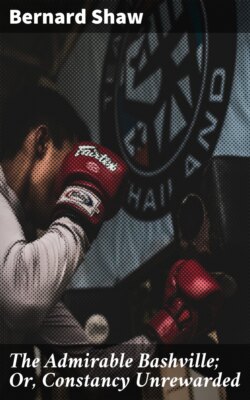The Admirable Bashville; Or, Constancy Unrewarded

Реклама. ООО «ЛитРес», ИНН: 7719571260.
Оглавление
Bernard Shaw. The Admirable Bashville; Or, Constancy Unrewarded
The Admirable Bashville; Or, Constancy Unrewarded
Table of Contents
PREFACE
The Admirable Bashville; or, Constancy Unrewarded
NOTE ON MODERN PRIZEFIGHTING
THREE PLAYS
BRENTANO'S
BERNARD SHAW'S. PLAYS
BRENTANO'S
Отрывок из книги
Bernard Shaw
Published by Good Press, 2021
.....
Besides, I am fond of blank verse. Not nineteenth century blank verse, of course, nor indeed, with a very few exceptions, any post-Shakespearean blank verse. Nay, not Shakespearean blank verse itself later than the histories. When an author can write the prose dialogue of the first scene in As You Like It, or Hamlet's colloquies with Rosencrantz and Guildenstern, there is really no excuse for The Seven Ages and "To be or not to be," except the excuse of a haste that made great facility indispensable. I am quite sure that any one who is to recover the charm of blank verse must frankly go back to its beginnings and start a literary pre-Raphaelite Brotherhood. I like the melodious sing-song, the clear simple one-line and two-line sayings, and the occasional rhymed tags, like the half closes in an eighteenth century symphony, in Peele, Kyd, Greene, and the histories of Shakespear. How any one with music in him can turn from Henry VI., John, and the two Richards to such a mess of verse half developed into rhetorical prose as Cymbeline, is to me explicable only by the uncivil hypothesis that the artistic qualities in the Elizabethan drama do not exist for most of its critics; so that they hang on to its purely prosaic content, and hypnotize themselves into absurd exaggerations of the value of that content. Even poets fall under the spell. Ben Jonson described Marlowe's line as "mighty"! As well put Michael Angelo's epitaph on the tombstone of Paolo Uccello. No wonder Jonson's blank verse is the most horribly disagreeable product in literature, and indicates his most prosaic mood as surely as his shorter rhymed measures indicate his poetic mood. Marlowe never wrote a mighty line in his life: Cowper's single phrase, "Toll for the brave," drowns all his mightinesses as Great Tom drowns a military band. But Marlowe took that very pleasant-sounding rigmarole of Peele and Greene, and added to its sunny daylight the insane splendors of night, and the cheap tragedy of crime. Because he had only a common sort of brain, he was hopelessly beaten by Shakespear; but he had a fine ear and a soaring spirit: in short, one does not forget "wanton Arethusa's azure arms" and the like. But the pleasant-sounding rigmarole was the basis of the whole thing; and as long as that rigmarole was practised frankly for the sake of its pleasantness, it was readable and speakable. It lasted until Shakespear did to it what Raphael did to Italian painting; that is, overcharged and burst it by making it the vehicle of a new order of thought, involving a mass of intellectual ferment and psychological research. The rigmarole could not stand the strain; and Shakespear's style ended in a chaos of half-shattered old forms, half-emancipated new ones, with occasional bursts of prose eloquence on the one hand, occasional delicious echoes of the rigmarole, mostly from Calibans and masque personages, on the other, with, alas! a great deal of filling up with formulary blank verse which had no purpose except to save the author's time and thought.
When a great man destroys an art form in this way, its ruins make palaces for the clever would-be great. After Michael Angelo and Raphael, Giulio Romano and the Carracci. After Marlowe and Shakespear, Chapman and the Police News poet Webster. Webster's specialty was blood: Chapman's, balderdash. Many of us by this time find it difficult to believe that pre-Ruskinite art criticism used to prostrate itself before the works of Domenichino and Guido, and to patronize the modest little beginnings of those who came between Cimabue and Masaccio. But we have only to look at our own current criticism of Elizabethan drama to satisfy ourselves that in an art which has not yet found its Ruskin or its pre-Raphaelite Brotherhood, the same folly is still academically propagated. It is possible, and even usual, for men professing to have ears and a sense of poetry to snub Peele and Greene and grovel before Fletcher and Webster—Fletcher! a facile blank verse penny-a-liner: Webster! a turgid paper cut-throat. The subject is one which I really cannot pursue without intemperance of language. The man who thinks The Duchess of Malfi better than David and Bethsabe is outside the pale, not merely of literature, but almost of humanity.
.....